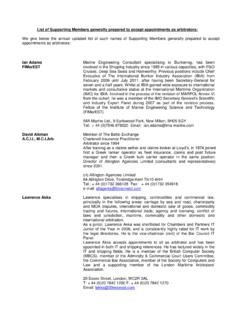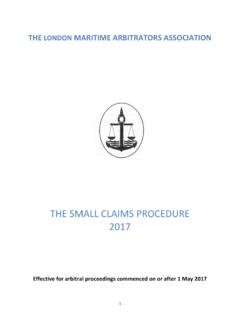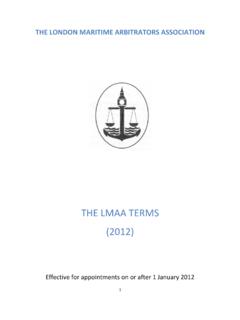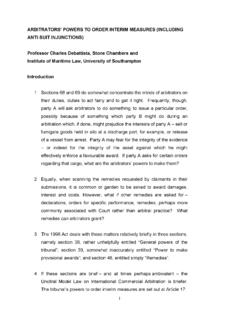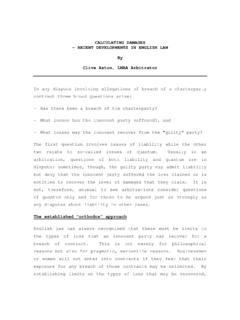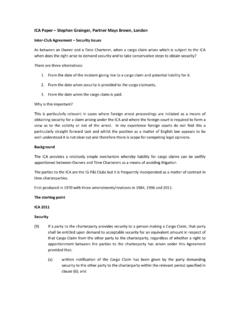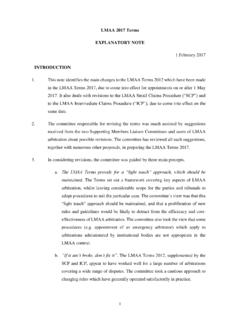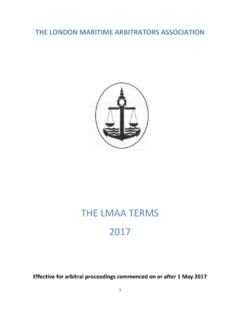Transcription of Off Hire under the New York Produce form: Loss of …
1 Off Hire under the New york Produce form : loss of Time & Time Thereby Lost The athena [2012] EWHC 3608 (Comm) 1. From time to time, a case involving simple facts requires basic notions to be re-examined, or examined properly for the first time. The Athena1 is such a case, asking: what is meant by loss of time in the New york Produce form off hire clause? Is it loss of time in the performance of the service required at the time when the ship was not working fully? Or does the charterer have to show that the whole voyage has been prolonged? More fundamentally, can the owner claim hire for time during which the ship was not providing the service then required of her2? 2. In an off hire claim under clause 15 of the New york Produce form , there will have been a period during which the full working of the ship was impaired.
2 In previous cases ( The Pythia, discussed below), time charterers have sought to use events after that period to increase their off hire claim. The athena involves the converse: an attempt by owners to use subsequent events to reduce, indeed to defeat, a claim for off hire in respect of the period of impaired working. It raises a genuinely novel point. 3. We have prepared this paper for the LMAA for two reasons: (1) firstly, to explain why (we think) The athena shines a direct light, for the first time, on some basic notions and provides an opportunity for a thorough review of the operation of the off hire clause; (2) secondly, noting that reliance was placed on Time Charters (6th Edn, paras. ), to record the hope that the particular language used there will not influence the result of such a review, one way or the other. 4. The case came before Walker J.
3 In the Commercial Court on an appeal from an arbitration award. The facts found by the arbitrators were that in January 2010, athena had been ordered by her time charterers to proceed to Benghazi roads to 1 Minerva Navigation Inc. v. Oceana Shipping AG v. Transatlantica Commodities [2012] EWHC 3608 (Comm), [2013] 1 Lloyd s Rep. 145, Walker J. 2 where, that is, the failure to do so (whether total or partial) was due to a cause specified in the off hire clause 2 await orders for discharge. Instead of doing that, her Master chose (on the owners instruction) to spend 11 days drifting 50 miles off the Libyan coast. So there was a total withdrawal of service for 11 days. The arbitrators also found that had the ship proceeded directly to Benghazi, as ordered, she would then have spent 11 days waiting at the roads; she would not have berthed any earlier than in the event she did.
4 (This was for complex reasons arising out of difficulties at the original discharge port in Syria; but these reasons had no bearing on the case. The same situation could have arisen for more workaday reasons: for example, if the ship, by arriving late, happened to miss congestion that would otherwise have delayed her getting into berth.) 5. The question was whether the ship was off hire during the drifting period . The arbitrators held that she was and that Whether the same time would have been lost for other reasons had she proceeded directly to Benghazi is irrelevant to a claim under the off hire clause . Walker J. disagreed and, on the arbitrators finding that the drifting time had not, in the event, delayed berthing at Benghazi, allowed the owners appeal and ruled that there was no time off hire. Leave to appeal to the Court of Appeal was granted and the appeal is set to be heard in July.
5 6. On the particular facts of The athena , it may be that waiting time at Benghazi roads would not have been laytime or time on demurrage under sub-voyage charters or sale arrangements. If so, there is perhaps a sense in which it would be a windfall for the charterers in this case were the ship off hire. But typically such waiting time will be laytime or time on demurrage (we return to this below). In any event, whether or not some element of windfall is possible on some facts, time charterers more fundamental point is that they do not agree to pay hire for time not spent providing the ordered service (where that is due to a cause specified in the off hire clause). Whether that is a good point depends, of course, on the language of the clause, and to that we now turn. 7. The first part of clause 15 of the New york Produce form which is the main off hire clause provides that in the event of the loss of time from.
6 [various specified causes] .. or by any other cause preventing the full working of the vessel, the payment of hire shall cease for the time thereby lost .. Clause 15 thus refers to loss of time twice: it begins, In the event of the loss of time .. and ends payment of hire shall cease for the time thereby lost .. So loss of time is both a pre-condition to the operation of the clause and the measure of how much hire is to be deducted. 3 8. In The athena , there could be no doubt that the Master s refusal to sail to Benghazi prevented the full working of the ship and was within the list of specified causes ( default of master had been added by the parties to the standard form ). But had there been loss of time from that cause and, if so, how much time [was] thereby lost ? 9. The arbitrators held that .. all [charterers] need to do.
7 Is demonstrate that there was .. an immediate loss of time. On this last, we are satisfied that the consequence of the Master s failure to proceed directly to Benghazi was a loss of time by her delayed arrival at that port.. The time was lost in relation to the service immediately required of her and that is sufficient. In other words, loss of time in clause 15 is loss of time in performing the service immediately required3. Since the loss of time in question was by way of total interruption in service ( full non-working), there was no partial service to be taken into account when working out the time thereby lost . This was not a case of partial interruption, or reduction, of the service ( non-full working). 10. The owners challenged the award, arguing that clause 15 required a loss of time in performing the charter service overall or loss of time to the adventure overall (emphasis added).
8 This concept of loss of time overall was not precisely defined, but appears to mean a net prolongation of the ship s then current employment. Thus, in The athena it was said there was no overall loss of time because the ship did not berth at Benghazi later than she would have done without the drifting. But if delay overall is what is required, equally it would be absent (or reduced) where, but for the off hire event, there would have been delay at a yet later stage, completing discharge, sailing from Benghazi, arriving or berthing at the next load port under the time charter, etc. 11. Walker J. allowed the owners appeal, concluding that there was no time thereby lost and therefore no off hire4. He was persuaded in particular by the 3 On that basis, the finding that arrival at Benghazi was delayed was not necessary: during the drifting period , the ship should have been making for Benghazi; she fully withheld her services, making no progress towards her ordered destination; there was thus a full loss of service for 11 days.
9 4 Walker J. s judgment is not as clear about this as it could have been, but we read him as agreeing (with the charterers and the arbitrators) that there was a loss of time , but reasoning that there was no time thereby lost . Hence, for example: his explanation at [27] of the formulation of the question of law on which leave to appeal had been granted under the 1996 Act; his conclusion at [69]-[70] that The Berge Sund did not assist the charterers because The only question which arose in [the 4 reasoning of Tuckey J. in The Ira [1995] 1 Lloyd s Rep. 103. As appears below, we respectfully believe that reasoning to be unsatisfactory. But we turn first to older authorities. 12. We start with Hogarth v. Miller [1891] AC 48. The off hire clause provided that, In the event of loss of time from [various causes], whereby the working of the vessel is stopped for more than forty-eight consecutive hours, the payment of hire shall cease until she be again in an efficient state to resume her service.]
10 (our emphasis). Thus, the clause required the charterer to demonstrate loss of time , and did so in a way echoed by the first line of clause 15 of the New york Produce form5. 13. The question that arises in The athena was not addressed in terms (nor has it been since). However the House of Lords does seem to have assumed that any interruption to the efficient working of the ship would involve loss of time . Lord Halsbury, articulating the view of the majority, said at , The hirer of the vessel wants to use the vessel for the purpose of the adventure and he is contemplating the possibility that by some of the causes indicated in the clause the efficient working of the vessel may be stopped, and so loss of time may be incurred; and he protects himself by saying, that during such period as the working of the vessel is stopped for more than forty-eight consecutive hours, payment shall cease.
